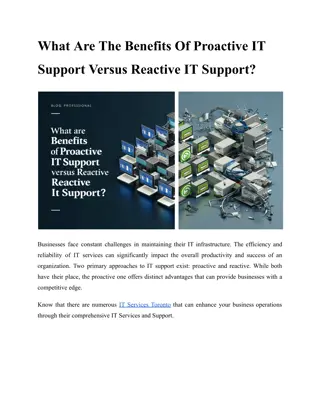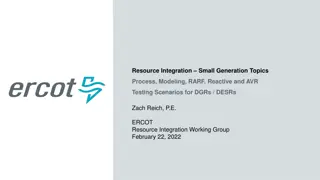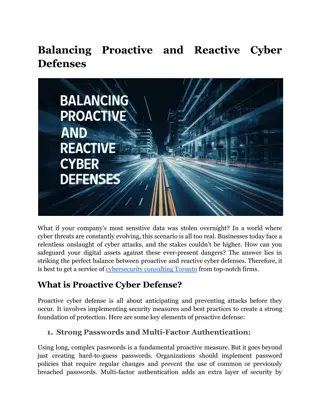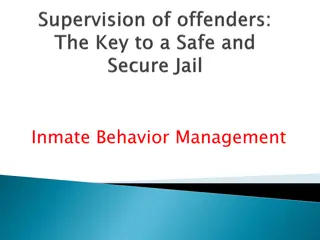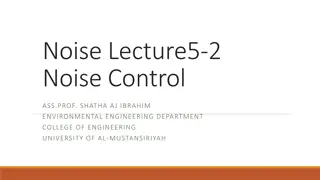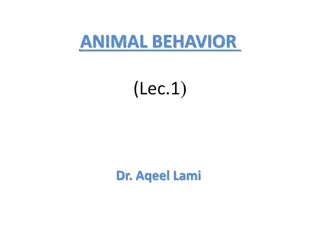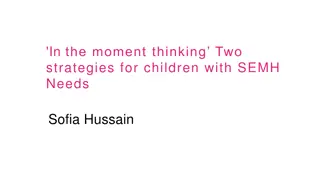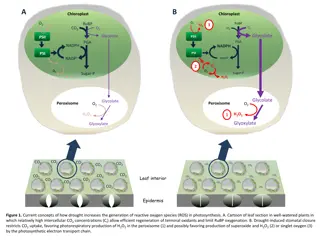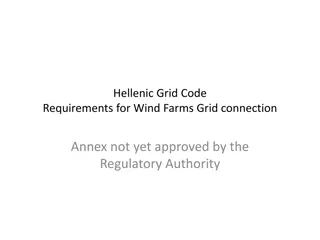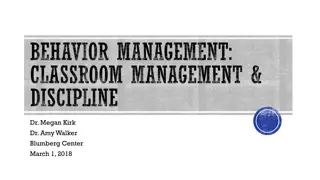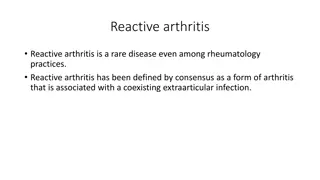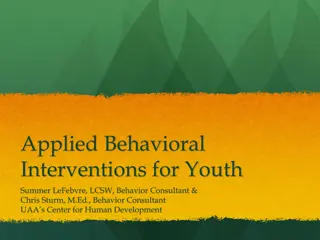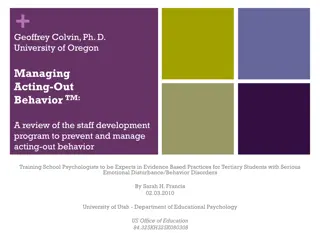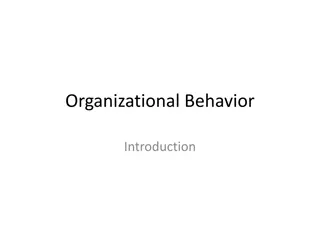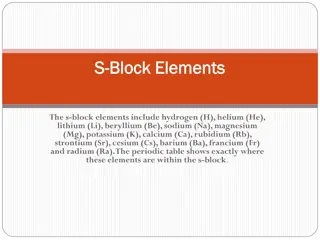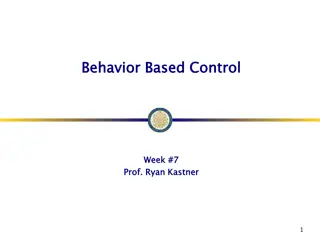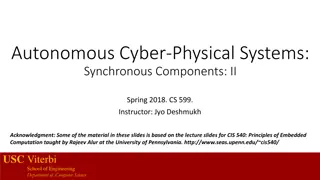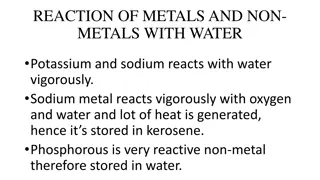Positive Behavior Support Interventions in Education
Learn about Tier 1 Positive Behavior Interventions & Supports (PBIS) developed by California State University and LA Unified School District. Explore evidence-based strategies like effective transitions, praise, choice-making, and establishing routines to promote positive behavior in students. Disco
1 views • 10 slides
Function Based Thinking
Function-based thinking in Missouri Schoolwide Positive Behavior Support, emphasizing data-based decision-making, mission clarity, and effective teaching practices. Understand how behavior is related to the environment and how environmental interventions play a key role in shaping expected behaviors
6 views • 27 slides
Addressing Predatory Behavior in the Fellowship
Predatory behavior, especially towards vulnerable members, is a concerning issue in the fellowship. This behavior includes unwelcome advances, exploitation of power dynamics, and institutional sexism. The discussion on predatory behavior necessitates honest dialogue and a united approach for a safer
3 views • 13 slides
Understanding COVID-19's Impact on Joint Health: Reactive Arthritis vs Viral Arthritis
Explore the distinction between reactive arthritis and viral arthritis in the context of COVID-19, discussing symptoms, triggers, and potential long-term consequences on joint health. Learn how viral infections can lead to acute arthralgia and arthritis, including common pathogens such as Hepatitis
0 views • 30 slides
What Are The Benefits Of Proactive IT Support Versus Reactive It Support?
Stop IT headaches! Discover how proactive IT support prevents problems & saves you money compared to reactive fixes.
1 views • 5 slides
Resource Integration Small Generation Topics and Processes
This document discusses various topics related to small generation resources such as Distributed Generation Resources (DGR) and Distributed Energy Storage Resources (DESR). It covers processes, modeling, Reactive and Automatic Voltage Regulation (AVR) testing scenarios, timelines, simplified modelin
1 views • 39 slides
Understanding C-Reactive Protein (CRP) Test: Uses and Principle
C-Reactive Protein (CRP) is a liver-produced protein that indicates inflammatory conditions. The CRP test helps detect infections, monitor diseases like cancer, and evaluate inflammatory conditions. The test principle involves latex agglutination for CRP detection in human serum.
0 views • 21 slides
Understanding the Power of Java Reactive Programming
Java Reactive Programming offers a solution to handling increasing data complexity and diverse device types in today's fast-paced business environment. By embracing reactive principles, businesses can accelerate their transformation by building flexible, loosely-coupled, and scalable systems. Learn
0 views • 18 slides
Understanding Consumer Behavior in Marketing
The design of a marketing program starts with understanding consumer behavior. Consumers, as the end users, play a crucial role in shaping market trends. Producers seek insights into consumer personas, market behaviors, and influencing factors. Management focuses on the consequences of consumer beha
2 views • 26 slides
Understanding Psychology: The Science of Behavior and Mental Processes
Psychology is the scientific study of behavior and mental processes. Psychologists study both observable behavior and private mental processes. The primary goals of psychology are to describe, understand, predict, and control behavior. Different branches of psychology, such as applied psychology, cl
2 views • 29 slides
Balancing Proactive and Reactive Cyber Defenses
Learn how to balance proactive and reactive strategies in cyber defense. Protect your business with a comprehensive security approach.\n
2 views • 6 slides
Understanding Inmate Behavior Management in Correctional Settings
Inmate Behavior Management in correctional facilities involves supervising inmates, implementing corrective discipline, and fostering a fair and consistent environment. It emphasizes the importance of behavior management plans, identifying undesirable traits in supervision, and passing educational a
0 views • 19 slides
Understanding Human Behavior: Foundations and Factors
Human behavior is a multifaceted subject influenced by genetic makeup, culture, and individual values. It encompasses both overt actions and covert thoughts, a product of the individual and environmental factors. Psychologists study behavior from visible (overt) actions like playing football to inne
0 views • 20 slides
Understanding Normal and Abnormal Behavior: Perspectives and Definitions
Normal behavior varies from person to person and society, influenced by individual preferences and societal norms. Abnormal behavior is characterized by an inability to function effectively or personal discomfort. The concept of normality and abnormality in psychology raises complex questions about
2 views • 8 slides
Understanding Noise Control Methods in Environmental Engineering
Explore the concepts of noise control in environmental engineering, focusing on mufflers, reactive mufflers, and noise control in the transmission path. Learn about absorptive and reactive mufflers, their principles, and applications. Discover how barriers and panels can effectively reduce noise tra
0 views • 9 slides
Understanding Human Behavior: Insights for Social Workers
This material delves into the intricacies of human behavior, exploring factors influencing behavior such as heredity, environment, intelligence, needs, and motives. It covers the concept of human behavior, stages in life from conception to old age, and theories of human development by eminent psycho
2 views • 71 slides
Understanding Animal Behavior and Ecology
Animal behavior encompasses a range of activities such as feeding, breeding, and social interactions. Ethology focuses on studying behavior in natural environments, while behavioral ecology examines ecological aspects like predator-prey interactions. Sociobiology delves into the evolution of social
3 views • 5 slides
Strategies for Children with SEMH Needs by Sofia Hussain
Exploring strategies for children with SEMH needs, this content discusses in-the-moment thinking and reactive strategies presented by Dr. Sofia Hussain. It delves into addressing concerning behaviors, practitioner emotions, and ways to support both practitioners and children. The approach emphasizes
0 views • 11 slides
Understanding Drought-Induced Reactive Oxygen Species Generation in Photosynthesis
Leaf responses to drought conditions leading to increased generation of reactive oxygen species (ROS) in photosynthesis are explained. Drought-induced stomatal closure affects CO2 uptake, promoting H2O2 production in peroxisomes and potential ROS production by the photosynthetic electron transport c
0 views • 5 slides
Requirements for Grid Connection of Wind Farms in Hellenic Grid Code
The Hellenic Grid Code outlines the specific requirements for wind farms regarding grid connection, including frequency and voltage operation boundaries, active/reactive power boundaries, voltage/reactive power control, and load-frequency control. These requirements ensure the safe and efficient int
0 views • 6 slides
Understanding Behavior Management in Classroom Settings
Explore the essential topics of behavior management, classroom strategies, and discipline in educational settings. Delve into the functions of behavior, impact of trauma on learning, and effective management techniques. Learn how to identify underlying reasons for student behaviors, discuss behavior
0 views • 76 slides
Systems-Oriented Concept Map Extension for Reactive Nitrogen Flows
International Organization for Chemical Sciences in Development presents a Systems-Oriented Concept Map Extension (SOCME) focusing on biogeochemical flows of reactive nitrogen from NH3. The concept explores core reaction subsystems, energy input subsystems, equilibrium conditions, and the integratio
0 views • 11 slides
Understanding Different Types of Artificial Intelligence
Artificial Intelligence is categorized into Narrow AI (Weak AI), General AI, and Super AI based on capabilities, while Reactive Machines, Limited Memory, Theory of Mind, and Self-Awareness are types based on functionality. Each type serves a specific purpose with varying levels of intelligence. Narr
0 views • 27 slides
Targeting Emotions to Facilitate Behavior Change in Older Adults
Efforts in changing health behavior have traditionally focused on social and cognitive factors, but recent evidence highlights the importance of affective states in decision-making and behavior change. Janey Peterson discusses the role of emotions in achieving and sustaining behavior change to benef
0 views • 11 slides
Grading Criteria for Effort and Behavior in Educational Reporting
Effort and behavior in educational settings are evaluated based on criteria ranging from Excellent to Causing Concern. Pupils demonstrating excellent behavior show respect, responsibility, and positive engagement in learning. Those with good behavior exhibit cooperation and respect for others, albei
0 views • 9 slides
Understanding Reactive Arthritis: Symptoms, Diagnosis, and Treatment
Reactive arthritis, a rare disease associated with infections like Chlamydia, Salmonella, and Yersinia, presents with musculoskeletal features such as oligoarthritis, enthesitis, and dactylitis. Extraarticular manifestations include eye involvement and genitourinary symptoms. Diagnosis involves lab
0 views • 9 slides
Understanding Applied Behavior Analysis (ABA) for Youth Interventions
Applied Behavior Analysis (ABA) is a science focusing on improving human behavior by increasing desired behaviors, teaching new skills, and generalizing behaviors. ABA emphasizes observable behaviors, measurement of behavior change, and the use of interventions in various settings like classrooms an
0 views • 25 slides
PBIS Expectations and Behavior Flowchart
The PBIS flowchart outlines behavior expectations and interventions for minor and major incidents in a school setting. It covers disrespectful behavior, disruption, defiance, property damage, theft, possession of weapons, and more. The flowchart guides teachers and staff on managing and addressing s
0 views • 6 slides
Managing Acting-Out Behavior: A Staff Development Program Review
This review discusses a staff development program created by Geoffrey Colvin, Ph.D., from the University of Oregon, focusing on preventing and managing acting-out behavior in students with emotional disturbance or behavior disorders. The program includes video presentations, strategies for behavior
0 views • 22 slides
Overview of Unified Power Flow Controller (UPFC) in Power Systems
A Unified Power Flow Controller (UPFC) is a combination of a Static Synchronous Compensator (STATCOM) and a Static Synchronous Series Compensator (SSSC) interconnected via a common DC link. UPFC allows bidirectional flow of real power and provides concurrent real and reactive series line compensatio
0 views • 20 slides
Systematic Testing of Reactive Software - A Case Study on LG Electric Oven
Overview of a case study conducted on LG Electric Oven using systematic testing of reactive software with non-deterministic events. The study focused on detecting concurrency bugs in the software controller of the oven through an automated testing framework that generates event timing sequences. It
0 views • 32 slides
Understanding Organizational Behavior and Individual Behavior
Organizational Behavior (OB) is a multidisciplinary field that combines knowledge from various disciplines to study and manage organizations effectively. It emphasizes the application of this knowledge to enhance organizational effectiveness and the well-being of participants. OB is a useful concept
0 views • 38 slides
Understanding S-Block Elements in the Periodic Table
The s-block elements in the Periodic Table consist of 14 elements with unique properties and characteristics. Lithium, sodium, and potassium are notable members of Group 1, characterized by their reactivity and ability to form alkaline solutions when in contact with water. These soft metals exhibit
0 views • 23 slides
Function-Based Behavior Support Plans: A Comprehensive Guide
Explore the process of developing Function-Based Behavior Support Plans (BSP) using Functional Behavioral Assessment (FBA). Understand the concepts of function and functional behavior assessment, learn how FBA/BSP fits within a multi-tiered support system, and practice developing BSP for students. D
0 views • 74 slides
Understanding Behavior-Based Control in Python Robotics Programming
Explore the world of behavior-based control in Python programming for robots, focusing on structuring robot programs, designing behaviors, arbitration schemes, and names/return values in Python. Learn how to control robots by organizing behaviors and decision-making units. Discover the importance of
0 views • 11 slides
Understanding Synchronous Reactive Components in Autonomous Cyber-Physical Systems
Synchronous Reactive Components (SRCs) play a crucial role in Autonomous Cyber-Physical Systems, involving inputs, state variables, outputs, and updates. Valuation functions, input valuations, and state valuations are key concepts in formalizing SRCs. Explore the definition, variables, valuations, a
0 views • 37 slides
Reactivity of Metals and Non-Metals: A Comprehensive Overview
Metals like potassium and sodium react vigorously with water, while non-metals like phosphorus are highly reactive and stored in water. Metals react with acids to form hydrogen gas, while non-metals generally do not react with acids. Reactivity series explains displacement reactions where more react
0 views • 11 slides
Reactive Tokens and Prosodic Features in Korean Conversation Analysis
This study delves into Reactive Tokens (RTs) and their role in Korean conversation, focusing on prosodic cues that elicit RT usage. It explores RT placement, differing functions, and the impact of boundary tones on RT utilization. Data collected through telephone conversations between young male spe
0 views • 20 slides
Reactive Clocks with Variability-Tracking Jitter in ICCD 2015
Explore the research on reactive clocks with variability-tracking jitter presented at ICCD 2015. The study delves into the cost of variability margins, timing analysis, clock variability comparison between PLL and reactive clocks, and adaptive frequency utilization. Understand the benefits and impli
0 views • 24 slides
Innovative Fluid Solutions for Textile and Leather Finishing
Specialty Fluids by Blue Star Silicone offer a comprehensive range of silicone-based products for textile and leather finishing. From softeners and water repellents to emulsions and lubricants, these solutions cater to the needs of formulators in the textile and leather industries. The Amino Fluids
0 views • 6 slides




